
Anales de Filologia Francesa
Scope & Guideline
Pioneering Research in French Literature and Language
Introduction
Aims and Scopes
- French Literature Analysis:
The journal examines both classical and contemporary French literature, exploring themes, narrative techniques, and the evolution of literary forms. - Linguistic Studies:
A significant emphasis is placed on the study of the French language, including syntactic, semantic, and phonetic analyses, often in a comparative context with other languages. - Cultural Critique:
Research in this area addresses cultural phenomena, including representations of gender, identity, and socio-political issues within French-speaking societies. - Interdisciplinary Approaches:
The journal encourages interdisciplinary studies that blend literature, linguistics, and cultural theory, fostering innovative methodologies and perspectives. - Teaching and Pedagogy:
The journal also addresses pedagogical issues related to the teaching of French as a foreign language (FFL), focusing on effective teaching strategies and materials. - Digital Humanities:
Emerging themes in the journal include the impact of digital technologies on literature and linguistics, reflecting on how these tools can enhance research and teaching.
Trending and Emerging
- Brevity and Short Forms:
A significant trend is the exploration of brevity in literature, with numerous studies focusing on short stories, novellas, and poetic forms, emphasizing their narrative techniques and thematic depth. - Digital Narratives and Social Media:
The intersection of literature and digital platforms, particularly social media, is increasingly recognized, with research analyzing how these mediums influence narrative forms and public discourse. - Gender Studies and Feminist Critique:
There is a growing emphasis on gender and feminist perspectives in literature, with a focus on the representation and experiences of women in various literary contexts. - Ecocriticism and Posthumanism:
Emerging themes in ecocriticism and posthumanism reflect a rising interest in environmental narratives and the representation of non-human entities in literature, indicating a broader cultural awareness. - Intercultural and Transnational Studies:
Research exploring intercultural exchanges and transnational influences in literature is on the rise, highlighting the interconnectedness of Francophone literature with global narratives.
Declining or Waning
- Traditional Literary Genres:
There has been a noticeable decrease in studies focused on traditional literary genres such as epic poetry or classical theatre, as researchers shift towards more contemporary forms and narratives. - Historical Linguistics:
Research specifically dedicated to historical linguistics appears to be declining, with fewer papers addressing the evolution of the French language over centuries. - Cultural Studies of Colonialism:
While once a significant area, the focus on colonial narratives and their impact on French literature has lessened, possibly due to a broader shift towards post-colonial and contemporary issues. - Translation Studies:
Although translation remains a relevant topic, the specific analysis of translation practices in historical contexts has decreased, indicating a shift towards modern translation issues. - Formalist Literary Criticism:
There seems to be a decline in purely formalist approaches to literary criticism, as researchers increasingly engage with socio-political contexts and interpretive frameworks.
Similar Journals
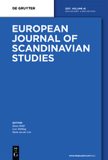
European Journal of Scandinavian Studies
Illuminating linguistic diversity and literary depth.European Journal of Scandinavian Studies is an esteemed journal published by Walter de Gruyter GmbH, dedicated to advancing scholarship in the fields of Cultural Studies, Linguistics and Language, and Literature and Literary Theory. Since its inception in 2010, the journal has been a pivotal platform for researchers and scholars, showcasing cutting-edge research and critical discussions pertaining to Scandinavian languages and cultures. With an ISSN of 2191-9399 and an E-ISSN of 2191-9402, the journal emphasizes accessibility to impactful academic work, despite its current non-open access model. While the journal is categorized within the Q4 quartile for Cultural Studies and Linguistics/Language, it has shown notable potential in ranking higher in its specialized domains, fostering a growing community of researchers invested in Scandinavian studies. The journal's office is located in Berlin, Germany, further enriching its European scholarly context. As it continues to evolve, the European Journal of Scandinavian Studies serves as a vital resource for academics seeking to engage deeply with the multifaceted aspects of Scandinavian culture and linguistics.
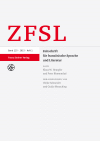
ZEITSCHRIFT FUR FRANZOSISCHE SPRACHE UND LITERATUR
Fostering Interdisciplinary Insights in French LiteratureZEITSCHRIFT FUR FRANZOSISCHE SPRACHE UND LITERATUR, published by FRANZ STEINER VERLAG GMBH, serves as a notable platform for scholarly discourse in the fields of French language and literature. With an ISSN of 0044-2747 and an E-ISSN of 2366-2425, this German journal has established itself as a respected source for researchers, educators, and students alike who seek to deepen their understanding of linguistic and literary theory. Although it currently does not offer Open Access, its rigorous peer-reviewed articles contribute significantly to the discourse of the humanities. Despite its current Q4 ranking in Linguistics and Language, as well as in Literature and Literary Theory, the journal continues to strive towards enriching the academic landscape, encouraging innovative research and interdisciplinary approaches. With a history of converging from 1987, and recent publications making strides from 2018 to 2022, this journal appeals to those interested in exploring the nuances and complexities of French literature and linguistics, making it a valuable resource for advancing knowledge in these fields.
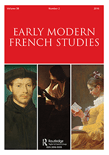
Early Modern French Studies
Unveiling the Dynamics of Early Modern FranceEarly Modern French Studies (ISSN: 2056-3035; E-ISSN: 2056-3043), published by Routledge Journals, Taylor & Francis Ltd, is an essential academic journal that delves into the complexities of early modern French culture, literature, and history. With a focus on interdisciplinary approaches, this journal offers scholars a platform to engage with the evolving dynamics of French studies from 2015 to 2024. Despite its current Q4 ranking in the categories of Cultural Studies, History, and Literature and Literary Theory, Early Modern French Studies seeks to elevate discussions and research that illuminate the richness of the early modern period. While offering traditional subscription options, the journal encourages submissions that challenge prevailing narratives and foster innovative dialogues within the field. This journal is crucial for anyone looking to contribute to or gain insights into the intricate tapestry of early modern French scholarship.

Dicenda-Cuadernos de Filologia Hispanica
Connecting Scholars through Open Access InsightsDicenda-Cuadernos de Filologia Hispanica, published by UNIV COMPLUTENSE MADRID, SERVICIO PUBLICACIONES, is a distinguished academic journal in the fields of linguistics, literature, and literary theory. Since its transition to Open Access in 2017, it has facilitated unrestricted dissemination of knowledge, making it an invaluable resource for researchers, scholars, and students interested in the rich tapestry of Hispanic philology. With an impact factor reflected by its Scopus rankings—at Q3 in Linguistics and Language and Q2 in Literature and Literary Theory—Dicenda serves as a vital platform for innovative research and critical discourse. The journal actively encourages submissions that explore contemporary and historical perspectives within its scope. Located in Madrid, Spain, the journal has steadily established itself as a significant contributor to the ongoing dialogue in the humanities, fostering a deeper understanding of linguistic and literary phenomena.

FRENCH REVIEW
Navigating the Rich Tapestry of French Academic InquiryFRENCH REVIEW, published by Johns Hopkins University Press, is a premier journal in the fields of Cultural Studies, Education, Linguistics and Language, and Literature and Literary Theory. With its ISSN 0016-111X and E-ISSN 2329-7131, this journal serves as a vital resource for scholars and practitioners seeking to engage with contemporary topics through rigorous academic discourse. The journal has made notable strides in its impact factor, ranking in the third quartile for Cultural Studies and Linguistics, as well as the second quartile for Literature. While it currently does not offer open access, FRENCH REVIEW remains committed to fostering critical analysis and interdisciplinary approaches, effectively contributing to the advancement of research and understanding in its respective fields. With its converged years spanning from 2002 to 2024, this journal is an essential platform for exchanging ideas and enhancing knowledge in the vibrant landscape of French studies and beyond.
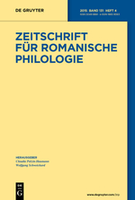
ZEITSCHRIFT FUR ROMANISCHE PHILOLOGIE
Exploring the Rich Tapestry of Romance Languages and LiteratureZEITSCHRIFT FUR ROMANISCHE PHILOLOGIE, published by Walter de Gruyter GmbH, stands as a prominent peer-reviewed journal dedicated to the fields of Linguistics, Literature, and Literary Theory. Established in 1877 and continuing its legacy to the present day, this esteemed journal offers a platform for comprehensive scholarship that explores the intricacies of Romance languages and their literary heritage. With a notable Q1 ranking in Literature and Literary Theory and a Q2 ranking in Linguistics and Language, it has secured its place among leading resources in the humanities. Researchers, educators, and students benefit from its rich historical context and current contributions to the understanding of Romance languages and literature. Though currently not available as Open Access, the journal prioritizes the dissemination of high-quality research, making significant strides in fostering academic dialogue and advancement. Its address at Genthiner Straße 13, Berlin, Germany, situates it in a hub of scholarly activity, bridging the past with contemporary literary discourse.

Francofonia-Studi e Ricerche sulle Letterature di Lingua Francese
Navigating the Landscape of French Linguistics and LiteratureFrancofonia-Studi e Ricerche sulle Letterature di Lingua Francese is a distinguished academic journal dedicated to the exploration of French language literature, published by CASA EDITRICE LEO S OLSCHKI. Located in Florence, Italy, this journal provides a scholarly platform for addressing contemporary issues, critical theories, and advancements in the fields of linguistics and literary studies. With an ISSN of 1121-953X and an E-ISSN of 2036-5659, it operates within the competitive framework of academia, currently positioned in the Q4 quartile for both Linguistics and Language, as well as Literature and Literary Theory, according to 2023 rankings. Although the journal does not offer open access, it is vital for researchers and students seeking to deepen their understanding of francophone literary traditions. Additionally, the journal's engagement in relevant discourses positions it uniquely, making it an essential resource for scholars interested in the nuances of linguistic and literary developments affecting French-language literature over converged years of publication (2020 to 2022). Explore this journal to connect with the vibrant community dedicated to francophone studies and contribute to the discourse in these intertwined fields.

French Studies in Southern Africa
Contributing to a Deeper Understanding of Francophone Heritage.French Studies in Southern Africa is a premier journal dedicated to advancing the field of French studies within the Southern African context. Published by the Association of French Studies in Southern Africa, this journal serves as a vital platform for scholars, researchers, and students engaged in exploring the rich intercultural dynamics, historical perspectives, and contemporary challenges of French language and literature in the region. With a focus on fostering academic discourse, French Studies in Southern Africa showcases original research articles, critical essays, and book reviews, contributing significantly to the understanding of Francophone cultures. While the journal is not open access, its rigorous peer-review process ensures high-quality scholarship that is essential for anyone involved in French studies or interested in the socio-cultural intersections of France and Southern Africa. By supporting the dissemination of knowledge and encouraging collaboration, this journal plays a crucial role in enhancing the visibility of French studies in Southern Africa.

Cuadernos de Filologia Italiana
Exploring the Depths of Italian Language and CultureCuadernos de Filologia Italiana is a distinguished academic journal dedicated to the study of Italian philology, published by UNIV COMPLUTENSE MADRID, SERVICIO PUBLICACIONES. Since its inception in 1994, it has embraced an Open Access model, allowing for unrestricted access to critical research and scholarship within the field. By facilitating a dynamic platform for the dissemination of high-quality research, this journal plays a vital role in advancing knowledge on Italian language, literature, and culture. With a commitment to fostering scholarly dialogue and innovation, Cuadernos de Filologia Italiana is an essential resource for researchers, professionals, and students seeking to deepen their understanding of Italian studies in an increasingly globalized academic landscape. The journal is based in Madrid, Spain, and continues to contribute significantly to the field through its rigorous peer-reviewed articles.
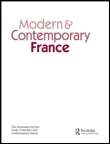
Modern & Contemporary France
Unveiling the Rich Tapestry of Modern FranceModern & Contemporary France is a prestigious journal published by Routledge Journals, Taylor & Francis Ltd, focusing on the rich tapestry of French culture, history, and politics from the 20th century to the present day. With an ISSN of 0963-9489 and an E-ISSN of 1469-9869, this influential periodical has established itself as a leading voice in the field, holding a Q2 ranking in both Cultural Studies and History as of 2023. This journal is an invaluable resource for researchers, professionals, and students, providing critical insights and fostering scholarly discussions around contemporary and modern issues concerning France. Its commitment to excellence is further underscored by its notable Scopus rankings, highlighting its significance in the realms of Arts, Humanities, and Social Sciences. Though it operates under a subscription model, the depth and breadth of articles published between 1993 and 2024 make it an essential tool for anyone seeking to understand the complexities of current French society and its historical underpinnings.